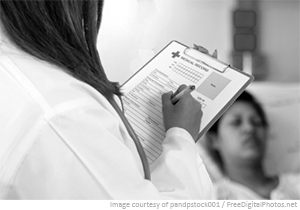
Emergency Department (ED) staff members have all felt the anxiety of a potential missed diagnosis. For those who have actually witnessed a missed chance, it is not hard to understand how agonizing it would be to realize the missing piece of information was right at your fingertips…had the interview process nailed down the correct information during patient evaluation.
This brings to mind how dependent ED team members are during the interview process on what the patient shares. Patients will sometimes tell us things we really don’t need to know and in other instances will tell us very little. That makes it important to understand that it is our obligation, as healthcare providers, to use interview skills that encourage, evoke and extract information from the patient.
This might seem an easy task but really, in this day and age, we are dealing with so many diverse cultures and languages that asking the right questions in terms that are understood can be very difficult. Not only do we need a concise and accurate history and medication profile, we also need the interview skills to elicit an appropriate response from the patient. Several things come to mind, like asking open ended questions and giving the patient the opportunity to define the conversation. Of course, the most basic interview skill is listening and, if a language barrier exists, the information might not be accurate unless an interpreter is involved.
Maybe now is a good time to re-educate ourselves on the interview process and take ownership of the fact that the first line of defense includes the quality of the interview and the information obtained.
As a takeaway for your ED staff, share the patient-centered interviewing tips that promote two-way conversation – and the best chance at getting the full story – found in: “Five-Step Patient-Centered Interviewing” at http://members.aapa.org/aapaconf2005/syllabus/5024FortinSmithInterview.pdf.
As a check-and-balance, let your ED’s healthcare professionals perform a self-assessment of their interview skills by checking off this list of common problems that trip us up, as published by Peter Lichstein, in Clinical Methods: The History, Physical, and Laboratory Examinations, 3rd edition:
- Confusing the traditional, rigid order of the written medical history with the actual process by which information emerges during the medical interview.
- Relying too heavily on directed, closed questions. This style discourages the patient's associations and spontaneous report of symptoms.
- Ignoring the patient's emotional responses and concerns during the interview process.
- Narrowing the scope of inquiry too early in the interview.
- Failure to clarify the seven dimensions of a symptom in the patient's own words.
- Insisting that the interview must be accomplished in one session (experienced clinicians return to the patient again and again to clarify the history).
- Limiting the list of diagnostic hypotheses before adequate data has been collected.
- Using questions that are leading, too complex, double-barreled or unclear.
- Failure to follow basic courtesies in the interview: lack of clear introductions, ignoring the patient's comfort, failure to establish an atmosphere of trust and confidentiality.
- Failure to elicit the patient's own ideas about the cause of the problem and the patient's fantasies about what the doctor will do.
- Note-taking that interrupts the flow of the interview.
(More content available at: http://www.ncbi.nlm.nih.gov/books/NBK349/)
Finally, if interpreter services are utilized as part of the interview process, be sure to document the interpreter’s name, what language was being interpreted and any other relevant points around questions asked and answered through this intermediary.
With a renewed focus on interviewing skills, ED team members – and healthcare providers in general – can avoid common problems that could lead to a missed diagnosis. When we ask the right questions and listen to the patient, we can target our response and provide the most appropriate treatment every time.
Do you have stories of how you overcame communication barriers through interviewing or how potential issues were avoided? Share them with us in the comments.
Cynthia D. Bullard, RN, Senior Professional Liability Claims Specialist